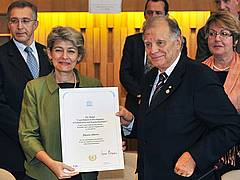Home > Press > First UNESCO Medals “For contributions to the development of nanoscience and nanotechnologies” awarded
 |
Abstract:
Scientists Zhores Alferov and Chunli Bai receive first UNESCO Medals "For contributions to the development of nanoscience and nanotechnologies"
First UNESCO Medals “For contributions to the development of nanoscience and nanotechnologies” awarded
Paris | Posted on November 4th, 2010The first UNESCO Medals "For contributions to the development of nanoscience and nanotechnologies" were awarded on 2 November at Paris headquarters to two laureates: Russian Academician Zhores Ivanovich Alferov, winner of the 2000 Nobel Prize in Physics; and Chunli Bai, Professor of Chemistry at the Laboratory of Molecular Nanostructure and Nanotechnology in Beijing and Executive Vice-President of the Chinese Academy of Sciences.
In her address at the award ceremony, the Director-General of UNESCO, Irina Bokova, hailed "two world-class scientists whose work has taken forward our understanding of nature and its power." Professor Alferov received the first medal in person; Professor Chunli Bai was represented by Shuyun Shi, Ambassador and Permanent Delegate of the People's Republic of China to UNESCO.
"This award is recognition of the tremendous benefits of progress in the fields of nanoscience and nanotechnologies on our societies, our economies and on all of us," continued Ms Bokova. "UNESCO is committed to supporting the development of this new knowledge base for its potential in assisting countries and societies, including and especially developing countries."
Eleonora Mitrofanova, Chairperson of UNESCO's Executive Board, introduced the two laureates. Among their achievements, Professor Bai is the inventor of sophisticated nano-research tools including the ultra-high-vacuum scanning tunnelling microscope and Professor Alferov developed the "ideal" semiconductor infrastructure that forms the basis of all microelectronic devices used today.
The Medal was established at the initiative of the International Commission responsible for developing the Nanoscience and Nanotechnologies theme for the Encyclopedia of Life Support Systems (EOLSS)* published by UNESCO and EOLSS Publishers. This initiative was supported by the Russian Federation's Permanent Delegation to UNESCO. The EOLSS constitutes one of the world's biggest web-based archives as a trans-disciplinary science base for sustainable development.
(*) www.eolss.net
####
For more information, please click here
Copyright © UNESCO
If you have a comment, please Contact us.Issuers of news releases, not 7th Wave, Inc. or Nanotechnology Now, are solely responsible for the accuracy of the content.
| Related News Press |
News and information
![]() Researchers develop molecular qubits that communicate at telecom frequencies October 3rd, 2025
Researchers develop molecular qubits that communicate at telecom frequencies October 3rd, 2025
![]() Next-generation quantum communication October 3rd, 2025
Next-generation quantum communication October 3rd, 2025
![]() "Nanoreactor" cage uses visible light for catalytic and ultra-selective cross-cycloadditions October 3rd, 2025
"Nanoreactor" cage uses visible light for catalytic and ultra-selective cross-cycloadditions October 3rd, 2025
Announcements
![]() Rice membrane extracts lithium from brines with greater speed, less waste October 3rd, 2025
Rice membrane extracts lithium from brines with greater speed, less waste October 3rd, 2025
![]() Researchers develop molecular qubits that communicate at telecom frequencies October 3rd, 2025
Researchers develop molecular qubits that communicate at telecom frequencies October 3rd, 2025
![]() Next-generation quantum communication October 3rd, 2025
Next-generation quantum communication October 3rd, 2025
![]() "Nanoreactor" cage uses visible light for catalytic and ultra-selective cross-cycloadditions October 3rd, 2025
"Nanoreactor" cage uses visible light for catalytic and ultra-selective cross-cycloadditions October 3rd, 2025
Grants/Sponsored Research/Awards/Scholarships/Gifts/Contests/Honors/Records
![]() Researchers tackle the memory bottleneck stalling quantum computing October 3rd, 2025
Researchers tackle the memory bottleneck stalling quantum computing October 3rd, 2025
![]() New discovery aims to improve the design of microelectronic devices September 13th, 2024
New discovery aims to improve the design of microelectronic devices September 13th, 2024
![]() Physicists unlock the secret of elusive quantum negative entanglement entropy using simple classical hardware August 16th, 2024
Physicists unlock the secret of elusive quantum negative entanglement entropy using simple classical hardware August 16th, 2024
|
|
||
|
|
||
| The latest news from around the world, FREE | ||
|
|
||
|
|
||
| Premium Products | ||
|
|
||
|
Only the news you want to read!
Learn More |
||
|
|
||
|
Full-service, expert consulting
Learn More |
||
|
|
||








